- Home
- Nathaniel Hawthorne
The Marble Faun; Or, The Romance of Monte Beni - Volume 2 Page 2
The Marble Faun; Or, The Romance of Monte Beni - Volume 2 Read online
Page 2
CHAPTER XXV
SUNSHINE
"Come," said the Count, "I see you already find the old house dismal.So do I, indeed! And yet it was a cheerful place in my boyhood. But, yousee, in my father's days (and the same was true of all my endless lineof grandfathers, as I have heard), there used to be uncles, aunts, andall manner of kindred, dwelling together as one family. They werea merry and kindly race of people, for the most part, and kept oneanother's hearts warm."
"Two hearts might be enough for warmth," observed the sculptor, "even inso large a house as this. One solitary heart, it is true, may be apt toshiver a little. But, I trust, my friend, that the genial blood of yourrace still flows in many veins besides your own?"
"I am the last," said Donatello gloomily. "They have all vanished fromme, since my childhood. Old Tomaso will tell you that the air of MonteBeni is not so favorable to length of days as it used to be. But that isnot the secret of the quick extinction of my kindred."
"Then you are aware of a more satisfactory reason?" suggested Kenyon.
"I thought of one, the other night, while I was gazing at the stars,"answered Donatello; "but, pardon me, I do not mean to tell it. Onecause, however, of the longer and healthier life of my forefathers was,that they had many pleasant customs, and means of making themselvesglad, and their guests and friends along with them. Nowadays we have butone!"
"And what is that?" asked the sculptor.
"You shall see!" said his young host.
By this time, he had ushered the sculptor into one of the numberlesssaloons; and, calling for refreshment, old Stella placed a cold fowlupon the table, and quickly followed it with a savory omelet, whichGirolamo had lost no time in preparing. She also brought some cherries,plums, and apricots, and a plate full of particularly delicate figs, oflast year's growth. The butler showing his white head at the door, hismaster beckoned to him. "Tomaso, bring some Sunshine!" said he. Thereadiest method of obeying this order, one might suppose, would havebeen to fling wide the green window-blinds, and let the glow of thesummer noon into the carefully shaded room. But, at Monte Beni, withprovident caution against the wintry days, when there is littlesunshine, and the rainy ones, when there is none, it was the hereditarycustom to keep their Sunshine stored away in the cellar. Old Tomasoquickly produced some of it in a small, straw-covered flask, out ofwhich he extracted the cork, and inserted a little cotton wool, toabsorb the olive oil that kept the precious liquid from the air.
"This is a wine," observed the Count, "the secret of making which hasbeen kept in our family for centuries upon centuries; nor would it availany man to steal the secret, unless he could also steal the vineyard, inwhich alone the Monte Beni grape can be produced. There is little elseleft me, save that patch of vines. Taste some of their juice, and tellme whether it is worthy to be called Sunshine! for that is its name.""A glorious name, too!" cried the sculptor. "Taste it," said Donatello,filling his friend's glass, and pouring likewise a little into his own."But first smell its fragrance; for the wine is very lavish of it, andwill scatter it all abroad."
"Ah, how exquisite!" said Kenyon. "No other wine has a bouquet likethis. The flavor must be rare, indeed, if it fulfill the promise of thisfragrance, which is like the airy sweetness of youthful hopes, that norealities will ever satisfy!"
This invaluable liquor was of a pale golden hue, like other of therarest Italian wines, and, if carelessly and irreligiously quaffed,might have been mistaken for a very fine sort of champagne. It was not,however, an effervescing wine, although its delicate piquancy produceda somewhat similar effect upon the palate. Sipping, the guest longedto sip again; but the wine demanded so deliberate a pause, in order todetect the hidden peculiarities and subtile exquisiteness of its flavor,that to drink it was really more a moral than a physical enjoyment.There was a deliciousness in it that eluded analysis, and--like whateverelse is superlatively good--was perhaps better appreciated in the memorythan by present consciousness.
One of its most ethereal charms lay in the transitory life of the wine'srichest qualities; for, while it required a certain leisure and delay,yet, if you lingered too long upon the draught, it became disenchantedboth of its fragrance and its flavor.
The lustre should not be forgotten, among the other admirable endowmentsof the Monte Beni wine; for, as it stood in Kenyon's glass, a littlecircle of light glowed on the table round about it, as if it were reallyso much golden sunshine.
"I feel myself a better man for that ethereal potation," observed thesculptor. "The finest Orvieto, or that famous wine, the Est Est Est ofMontefiascone, is vulgar in comparison. This is surely the wine of theGolden Age, such as Bacchus himself first taught mankind to press fromthe choicest of his grapes. My dear Count, why is it not illustrious?The pale, liquid gold, in every such flask as that, might be solidifiedinto golden scudi, and would quickly make you a millionaire!"
Tomaso, the old butler, who was standing by the table, and enjoyingthe praises of the wine quite as much as if bestowed upon himself, madeanswer,--"We have a tradition, Signore," said he, "that this rare wineof our vineyard would lose all its wonderful qualities, if any of itwere sent to market. The Counts of Monte Beni have never parted with asingle flask of it for gold. At their banquets, in the olden time, theyhave entertained princes, cardinals, and once an emperor and once apope, with this delicious wine, and always, even to this day, it hasbeen their custom to let it flow freely, when those whom they love andhonor sit at the board. But the grand duke himself could not drink thatwine, except it were under this very roof!"
"What you tell me, my good friend," replied Kenyon, "makes me veneratethe Sunshine of Monte Beni even more abundantly than before. As Iunderstand you, it is a sort of consecrated juice, and symbolizes theholy virtues of hospitality and social kindness?"
"Why, partly so, Signore," said the old butler, with a shrewd twinklein his eye; "but, to speak out all the truth, there is another excellentreason why neither a cask nor a flask of our precious vintage shouldever be sent to market. The wine, Signore, is so fond of its nativehome, that a transportation of even a few miles turns it quite sour. Andyet it is a wine that keeps well in the cellar, underneath this floor,and gathers fragrance, flavor, and brightness, in its dark dungeon. Thatvery flask of Sunshine, now, has kept itself for you, sir guest (as amaid reserves her sweetness till her lover comes for it), ever since amerry vintage-time, when the Signore Count here was a boy!"
"You must not wait for Tomaso to end his discourse about the wine,before drinking off your glass," observed Donatello. "When once theflask is uncorked, its finest qualities lose little time in making theirescape. I doubt whether your last sip will be quite so delicious as youfound the first."
And, in truth, the sculptor fancied that the Sunshine became almostimperceptibly clouded, as he approached the bottom of the flask. Theeffect of the wine, however, was a gentle exhilaration, which did not sospeedily pass away.
Being thus refreshed, Kenyon looked around him at the antique saloonin which they sat. It was constructed in a most ponderous style, witha stone floor, on which heavy pilasters were planted against the wall,supporting arches that crossed one another in the vaulted ceiling. Theupright walls, as well as the compartments of the roof, were completelyCovered with frescos, which doubtless had been brilliant when firstexecuted, and perhaps for generations afterwards. The designs were ofa festive and joyous character, representing Arcadian scenes, wherenymphs, fauns, and satyrs disported themselves among mortal youths andmaidens; and Pan, and the god of wine, and he of sunshine and music,disdained not to brighten some sylvan merry-making with the scarcelyveiled glory of their presence. A wreath of dancing figures, inadmirable variety of shape and motion, was festooned quite round thecornice of the room.
In its first splendor, the saloon must have presented an aspect bothgorgeous and enlivening; for it invested some of the cheerfullest ideasand emotions of which the human mind is susceptible with the externalreality of beautiful form, and rich, harmonious glow and variety ofcolor. But
the frescos were now very ancient. They had been rubbed andscrubbed by old Stein and many a predecessor, and had been defaced inone spot, and retouched in another, and had peeled from the wall inpatches, and had hidden some of their brightest portions under drearydust, till the joyousness had quite vanished out of them all. It wasoften difficult to puzzle out the design; and even where it was morereadily intelligible, the figures showed like the ghosts of dead andburied joys,--the closer their resemblance to the happy past, thegloomier now. For it is thus, that with only an inconsiderable change,the gladdest objects and existences become the saddest; hope fadinginto disappointment; joy darkening into grief, and festal splendor intofunereal duskiness; and all evolving, as their moral, a grim identitybetween gay things and sorrowful ones. Only give them a little time, andthey turn out to be just alike!
"There has been much festivity in this saloon, if I may judge by thecharacter of its frescos," remarked Kenyon, whose spirits were stillupheld by the mild potency of the Monte Beni wine. "Your forefathers,my dear Count, must have been joyous fellows, keeping up the vintagemerriment throughout the year. It does me good to think of themgladdening the hearts of men and women, with their wine of Sunshine,even in the Iron Age, as Pan and Bacchus, whom we see yonder, did in theGolden one!"
"Yes; there have been merry times in the banquet hall of Monte Beni,even within my own remembrance," replied Donatello, looking gravelyat the painted walls. "It was meant for mirth, as you see; and whenI brought my own cheerfulness into the saloon, these frescos lookedcheerful too. But, methinks, they have all faded since I saw them last."
"It would be a good idea," said the sculptor, falling into hiscompanion's vein, and helping him out with an illustration whichDonatello himself could not have put into shape, "to convert this salooninto a chapel; and when the priest tells his hearers of the instabilityof earthly joys, and would show how drearily they vanish, he may pointto these pictures, that were so joyous and are so dismal. He could notillustrate his theme so aptly in any other way."
"True, indeed," answered the Count, his former simplicity strangelymixing itself up with ah experience that had changed him; "and yonder,where the minstrels used to stand, the altar shall be placed. A sinfulman might do all the more effective penance in this old banquet hall."
"But I should regret to have suggested so ungenial a transformation inyour hospitable saloon," continued Kenyon, duly noting the change inDonatello's characteristics. "You startle me, my friend, by so ascetic adesign! It would hardly have entered your head, when we first met. Praydo not,--if I may take the freedom of a somewhat elder man to adviseyou," added he, smiling,--"pray do not, under a notion of improvement,take upon yourself to be sombre, thoughtful, and penitential, like allthe rest of us."
Donatello made no answer, but sat awhile, appearing to follow withhis eyes one of the figures, which was repeated many times over in thegroups upon the walls and ceiling. It formed the principal link of anallegory, by which (as is often the case in such pictorial designs)the whole series of frescos were bound together, but which it would beimpossible, or, at least, very wearisome, to unravel. The sculptor'seyes took a similar direction, and soon began to trace through thevicissitudes,--once gay, now sombre,--in which the old artist hadinvolved it, the same individual figure. He fancied a resemblance in itto Donatello himself; and it put him in mind of one of the purposes withwhich he had come to Monte Beni.
"My dear Count," said he, "I have a proposal to make. You must let meemploy a little of my leisure in modelling your bust. You remember whata striking resemblance we all of us--Hilda, Miriam, and I--found betweenyour features and those of the Faun of Praxiteles. Then, it seemed anidentity; but now that I know your face better, the likeness is far lessapparent. Your head in marble would be a treasure to me. Shall I haveit?"
"I have a weakness which I fear I cannot overcome," replied the Count,turning away his face. "It troubles me to be looked at steadfastly."
"I have observed it since we have been sitting here, though neverbefore," rejoined the sculptor. "It is a kind of nervousness, Iapprehend, which, you caught in the Roman air, and which grows upon you,in your solitary life. It need be no hindrance to my taking your bust;for I will catch the likeness and expression by side glimpses, which(if portrait painters and bust makers did but know it) always bring homericher results than a broad stare."
"You may take me if you have the power," said Donatello; but, even as hespoke, he turned away his face; "and if you can see what makes me shrinkfrom you, you are welcome to put it in the bust. It is not my will, butmy necessity, to avoid men's eyes. Only," he added, with a smile whichmade Kenyon doubt whether he might not as well copy the Faun as model anew bust,--"only, you know, you must not insist on my uncovering theseears of mine!"
"Nay; I never should dream of such a thing," answered the sculptor,laughing, as the young Count shook his clustering curls. "I could nothope to persuade you, remembering how Miriam once failed!"
Nothing is more unaccountable than the spell that often lurks in aspoken word. A thought may be present to the mind, so distinctly thatno utterance could make it more so; and two minds may be conscious ofthe same thought, in which one or both take the profoundest interest;but as long as it remains unspoken, their familiar talk flows quietlyover the hidden idea, as a rivulet may sparkle and dimple over somethingsunken in its bed. But speak the word, and it is like bringing up adrowned body out of the deepest pool of the rivulet, which has beenaware of the horrible secret all along, in spite of its smiling surface.
And even so, when Kenyon chanced to make a distinct reference toDonatello's relations with Miriam (though the subject was already inboth their minds), a ghastly emotion rose up out of the depths of theyoung Count's heart. He trembled either with anger or terror, andglared at the sculptor with wild eyes, like a wolf that meets you inthe forest, and hesitates whether to flee or turn to bay. But, as Kenyonstill looked calmly at him, his aspect gradually became less disturbed,though far from resuming its former quietude.
"You have spoken her name," said he, at last, in an altered andtremulous tone; "tell me, now, all that you know of her."
"I scarcely think that I have any later intelligence than yourself,"answered Kenyon; "Miriam left Rome at about the time of your owndeparture. Within a day or two after our last meeting at the Church ofthe Capuchins, I called at her studio and found it vacant. Whither shehas gone, I cannot tell."
Donatello asked no further questions.
They rose from table, and strolled together about the premises, whilingaway the afternoon with brief intervals of unsatisfactory conversation,and many shadowy silences. The sculptor had a perception of change inhis companion,--possibly of growth and development, but certainly ofchange,--which saddened him, because it took away much of the simplegrace that was the best of Donatello's peculiarities.
Kenyon betook himself to repose that night in a grim, old, vaultedapartment, which, in the lapse of five or six centuries, had probablybeen the birth, bridal, and death chamber of a great many generationsof the Monte Beni family. He was aroused, soon after daylight, by theclamor of a tribe of beggars who had taken their stand in a littlerustic lane that crept beside that portion of the villa, and wereaddressing their petitions to the open windows. By and by they appearedto have received alms, and took their departure.
"Some charitable Christian has sent those vagabonds away," thought thesculptor, as he resumed his interrupted nap; "who could it be? Donatellohas his own rooms in the tower; Stella, Tomaso, and the cook are aworld's width off; and I fancied myself the only inhabitant in this partof the house."
In the breadth and space which so delightfully characterize an Italianvilla, a dozen guests might have had each his suite of apartmentswithout infringing upon one another's ample precincts. But, so far asKenyon knew, he was the only visitor beneath Donatello's widely extendedroof.

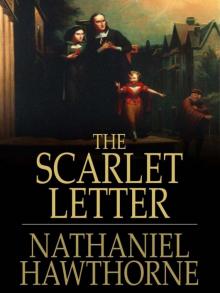 The Scarlet Letter
The Scarlet Letter Young Goodman Brown : By Nathaniel Hawthorne - Illustrated
Young Goodman Brown : By Nathaniel Hawthorne - Illustrated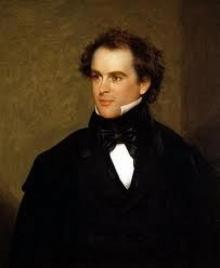 The Birthmark
The Birthmark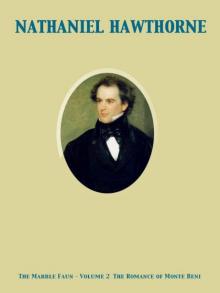 The Marble Faun; Or, The Romance of Monte Beni - Volume 1
The Marble Faun; Or, The Romance of Monte Beni - Volume 1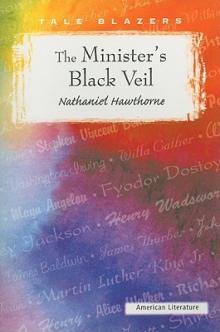 The Minister's Black Veil
The Minister's Black Veil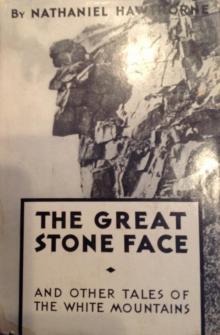 The Great Stone Face, and Other Tales of the White Mountains
The Great Stone Face, and Other Tales of the White Mountains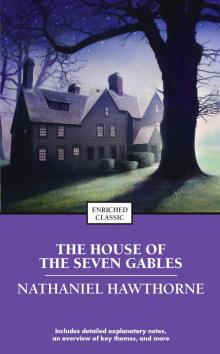 The House of the Seven Gables
The House of the Seven Gables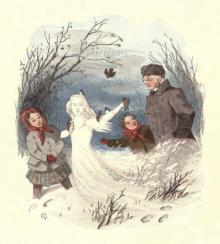 The Snow Image
The Snow Image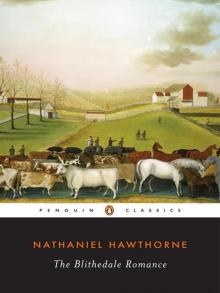 The Blithedale Romance
The Blithedale Romance Rappaccini's Daughter: By Nathaniel Hawthorne - Illustrated
Rappaccini's Daughter: By Nathaniel Hawthorne - Illustrated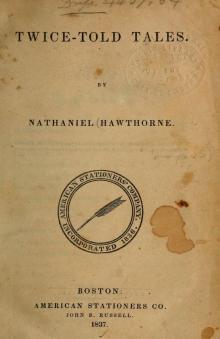 Twice-Told Tales
Twice-Told Tales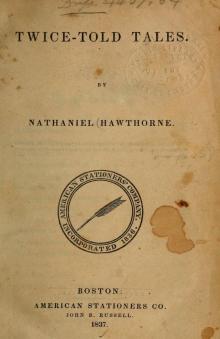 Twice Told Tales
Twice Told Tales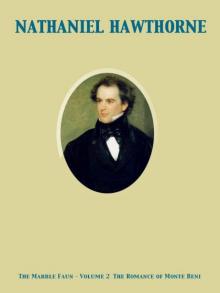 The Marble Faun; Or, The Romance of Monte Beni - Volume 2
The Marble Faun; Or, The Romance of Monte Beni - Volume 2_preview.jpg) Footprints on the Sea-Shore (From Twice Told Tales)
Footprints on the Sea-Shore (From Twice Told Tales)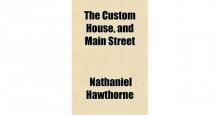 Main Street
Main Street_preview.jpg) The Seven Vagabonds (From Twice Told Tales)
The Seven Vagabonds (From Twice Told Tales) Fanshawe
Fanshawe Chippings with a Chisel
Chippings with a Chisel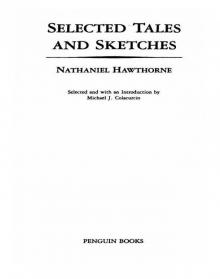 Selected Tales and Sketches
Selected Tales and Sketches Young Goodman Brown
Young Goodman Brown Roger Malvin's Burial
Roger Malvin's Burial The Prophetic Pictures
The Prophetic Pictures The Village Uncle
The Village Uncle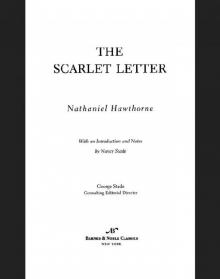 Scarlet Letter (Barnes & Noble Classics Series)
Scarlet Letter (Barnes & Noble Classics Series) The Procession of Life
The Procession of Life Drowne's Wooden Image
Drowne's Wooden Image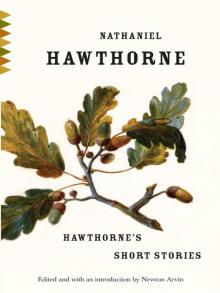 Hawthorne's Short Stories
Hawthorne's Short Stories My Kinsman, Major Molineux
My Kinsman, Major Molineux Legends of the Province House
Legends of the Province House Foot-Prints on the Sea-Shore
Foot-Prints on the Sea-Shore The Haunted Quack
The Haunted Quack Tanglewood Tales
Tanglewood Tales The Seven Vagabonds
The Seven Vagabonds Mosses from an Old Manse, Volume 2
Mosses from an Old Manse, Volume 2 The Canterbury Pilgrims
The Canterbury Pilgrims Wakefield
Wakefield The Gray Champion
The Gray Champion The White Old Maid
The White Old Maid The Snow-Image: A Childish Miracle
The Snow-Image: A Childish Miracle The Gentle Boy
The Gentle Boy Mr. Higginbotham's Catastrophe
Mr. Higginbotham's Catastrophe![The Threefold Destiny: A Fairy Legend, by Ashley Allen Royce [pseud.] Read online](http://i1.bookreadfree.com/i2/04/10/the_threefold_destiny_a_fairy_legend_by_ashley_allen_royce_pseud__preview.jpg) The Threefold Destiny: A Fairy Legend, by Ashley Allen Royce [pseud.]
The Threefold Destiny: A Fairy Legend, by Ashley Allen Royce [pseud.] Lady Eleanore`s Mantle
Lady Eleanore`s Mantle The Great Carbuncle
The Great Carbuncle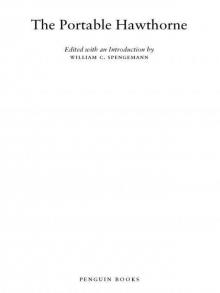 The Portable Hawthorne (Penguin Classics)
The Portable Hawthorne (Penguin Classics)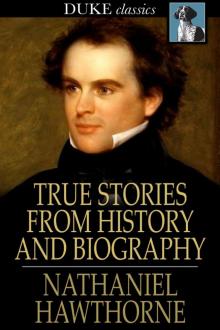 True Stories from History and Biography
True Stories from History and Biography